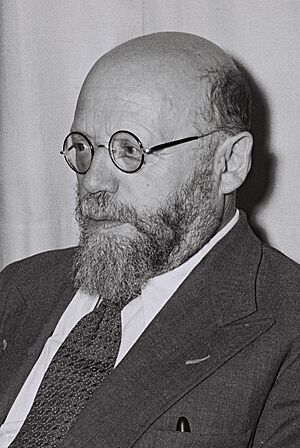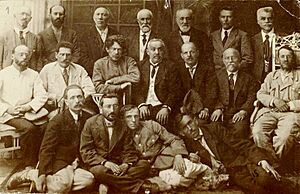Ben-Zion Dinur facts for kids
Quick facts for kids
Ben-Zion Dinur
|
|
|---|---|

Dinur in 1951
|
|
| Ministerial roles | |
| 1951–1955 | Minister of Education |
| Faction represented in the Knesset | |
| 1949–1951 | Mapai |
| Personal details | |
| Born |
Ben-Zion Dinaburg
2 January 1884 Khorol, Russian Empire (now Poltava Oblast, Ukraine) |
| Died | 8 July 1973 (aged 89) |
Ben-Zion Dinur (Hebrew: בן ציון דינור) (born January 1884 – died 8 July 1973) was an important Israeli historian, educator, and politician. He was a professor of Jewish history at the Hebrew University of Jerusalem. He also served as the Minister of Education and was a member of the Knesset, Israel's parliament.
Dinur was one of the people who helped create Yad Vashem, a memorial and museum about the Holocaust. He was also a member of the Israel Academy of Sciences. The Dinur Center for Research in Jewish History was named in his honor.
Contents
About Ben-Zion Dinur
Ben-Zion Dinaburg, who later changed his name to Dinur, was born in Khorol, a town in the Russian Empire. This area is now part of Ukraine. He received his early education in traditional Jewish schools called yeshivot in Lithuania.
He became interested in the Haskalah, which was a movement for Jewish enlightenment. In 1900, he became a Rabbi. He also traveled to learn about different Jewish traditions. Between 1902 and 1911, he worked as a Zionist activist and teacher. This work even led to a brief arrest.
In 1910, he married Bilhah Feingold, who was also a teacher. In 1911, he went to study at universities in Europe, including Berlin University and the University of Bern. He focused on the history of Jews in the Land of Israel during the Roman Empire. Due to world events like World War I and the October Revolution, he could not finish his PhD at the University of Petrograd. He later lectured at Odesa University from 1920 to 1921.
His Work as an Educator and Historian
In 1921, Dinur made aliyah, meaning he moved to Palestine. From 1923 to 1948, he taught at the Jewish Teachers' Training College in Jerusalem. He later became the head of the college.
In 1936, he started lecturing at the Hebrew University in modern Jewish history. He became a full professor in 1948. Dinur believed in studying Jewish history from a global perspective. He wrote a major work called "The History of Israel from Its Early Days to Our Times."
He also put together a huge collection called "Israel in the Exile." This work covered the history of the Jewish people up to the time of the Black Death. His research looked at everyday life, like family, marriage, and holidays. He also studied how Jewish communities interacted with non-Jews.
Dinur believed that Zionism, the movement to create a Jewish homeland, was a very old idea. He saw it as a "huge river" that included all the struggles of the Jewish people throughout history. He also thought that messianic ideas played a big part in Jewish history.
Some of his most famous historical books are "Israel in Its Land" and "Israel in Exile." He also wrote two books about his own life: "In a Sunken World" and "In Days of War and Revolution."
His Political Role
Ben-Zion Dinur was elected to the first Knesset, Israel's parliament, as a member of the Mapai party. From 1951 to 1955, he served as the Minister of Education and Culture.
During his time as minister, he was responsible for the 1953 State Education Law. This law changed Israel's education system. It made sure that all schools followed a national curriculum, rather than being run by different political parties.
From 1953 to 1959, he was also the president of Yad Vashem. This organization is dedicated to remembering the victims of the Holocaust.
Awards and Honors
Dinur received several important awards for his contributions:
- He was awarded the Israel Prize twice. This prize is Israel's highest honor. It was actually established at his suggestion when he was Minister of Education.
- He received it in 1958 for his work in Jewish studies.
- He received it again in 1973 for his contributions to education.
- In 1967, he received the Yakir Yerushalayim (Worthy Citizen of Jerusalem) award. This award honors people who have made special contributions to the city of Jerusalem.
Published Works
Here are some of the books Ben-Zion Dinur wrote:
- Toldot Yisrael" (The History of Israel) (1918)
- Lovers of Zion (1932–1934)
- Our Rabbi Moshe Ben Maimon: His Life, Writings, Activities and Views (1935)
- Israel in its Land: From the First Days of Israel until the Babylonian Exile: Sources and Documents (1938)
- Path Makers: Prominent Figures in the Sad History of the Return to Zion and the Renewal of Israel (1946)
- The Changing of the Generations: Researches and Studies in the History of Israel from Early Modern Times (1955)
- A Vanished World: Memories of a Way of Life" (Biography) (1958)
- Remember: Issues of the Holocaust and its Lessons (1958)
- Israel in Exile 2nd Edition (expanded) five volumes (1958)
- Days of War and Revolution: Memories of a Way of Life (1961)
- My Generation: Characteristics and Traits of Scholars and Educators, Public Personalities and Gate Keepers (1964)
- Benjamin Zeev Herzl: the Man, his Path and Personality, his Vision and Activities (1968)
- Tractate Avot: Commentary and Explanation with Introduction (1972)
See also
- List of Israel Prize recipients
 | Laphonza Butler |
 | Daisy Bates |
 | Elizabeth Piper Ensley |


